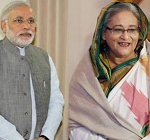As India’s prime minister elect Narendra Modi prepares to take office, he is being inundated with advice on foreign policy priorities – be tough with Pakistan on terrorism; be cool towards the U.S. because of the cancelled visa issue; be calm in the face of Chinese provocations on the border, and so on.
The Bharatiya Janata Party (BJP) had set out its foreign policy agenda in its election manifesto, but like all governments it too will have to respond to events as they happen. At the same time, it must also act proactively to take advantage of emergent opportunities.
The BJP’s manifesto mentions that South Asia will be a focus. In the region, addressing relations with Bangladesh is a less glaring but important foreign policy initiative that the Modi government can take. It will be easy as well as significant to take the relationship to a higher level because the Sheikh Hasina-led government has, in recovering the secular ethos of its own liberation struggle, already restored trust to relations with India and been responsive to our concerns on terrorism. Equally importantly, all the preparatory work done for the unproductive 2011 visit of former Prime Minister Manmohan Singh is available for early implementation.
If done right, this could set the mould for India’s relations with other neighbours.
Our South Asian neighbours have recently been among the first to reach out and congratulate Modi. In turn, he has invited them for his inauguration ceremony on May 26. Prime Minister Sheikh Hasina has said that she is “delighted to see a great friend of Bangladesh leading an extremely friendly country, India, in the coming days.” This warmth is intact despite Modi’s denunciation of illegal immigration from Bangladesh – especially the unprecedented characterisation of Hindu migrants as “our brothers” who will be extended citizenship rights, while illegal migrants (Muslims) ostensibly brought to India for vote-bank politics must return to Bangladesh.
So far, it has not been possible to deal constructively with the issue of illegal migration. On the one hand, previous Congress governments in New Delhi and Assam, and Left-wing governments in West Bengal, deliberately obfuscated the problem. On the other hand, Bangladeshi governments, especially those led by the Bangladesh National Party (BNP), insisted that not a single person from their country had illegally gone to India.
Initially, the discord in the relationship was due to the anti-India stance of the military governments that followed the assassination of Sheikh Mujibur Rahman in 1974; they refused to acknowledge India’s contribution to the Independence of Bangladesh. However, the Hasina government more than compensated by honouring former prime minister Indira Gandhi and senior army officers alongside whom the Mukti Bahini had fought to liberate Bangladesh in 1971.
Secondly, BNP-led governments have, in the past, harboured anti-India separatist groups such as ULFA, and Islamic terrorist groups like HuJI, even sometimes characterising them as “freedom fighters.” But the Hasina government has courageously extradited high-profile terrorists such as Arabinda Rajkhowa (ULFA).
However, the Bangladeshi government was greatly disappointed when Manmohan Singh’s visit to Dhaka in September 2011, intended to chart a new course in relations, failed to conclude the Land Boundary Agreement (LBA) on the border and the Teesta River Agreement. That dashed hopes that Bangladesh will gradually increase transit facilities to India’s north-eastern states, which has been our longest-standing imperative in relations with Bangladesh.
The possibility of a transformed relationship was jeopardised by the last minute rejection of the accord on sharing the waters of the Teesta by West Bengal Chief Minister Mamata Banerjee. It was aggravated by the subsequent refusal of the Congress government in Assam to accept the carefully worked-out exchanges of enclaves and adverse possessions, and the obdurate refusal of Modi’s own BJP to ratify the LBA in Parliament. Since progress in the relationship was stalled on such whimsical grounds, the path to its retrieval lies in resuming where it left off.
Although the Bangladeshi prime minister cannot attend Modi’s inauguration due to a scheduling conflict – she will be in Japan – the real question is whether Modi will proactively try to remove the irritants in the relationship.
His government can then work to expand the meagre transport links between the two countries to create a flourishing network of connectivity with our north-eastern “seven sisters,” eventually leading to oil and gas pipelines from fossil fuel-rich Myanmar. This will revitalise India’s north-eastern states, and enable the trade relationship between India and Bangladesh to become a precursor to a genuine South Asia Free Trade Area.
Making Bangladesh one of the first countries on Modi’s foreign itinerary will underline the importance India attaches to its neighbours, as well as send signals to countries like Nepal and Pakistan that a more positive dynamic is possible bilaterally and for the region as a whole.
Neelam Deo is Co-founder and Director, Gateway House: Indian Council on Global Relations; She has been the Indian Ambassador to Denmark and Ivory Coast; and former Consul General in New York.
This article was exclusively written for Gateway House: Indian Council on Global Relations. You can read more exclusive content here.
For interview requests with the author, or for permission to republish, please contact outreach@gatewayhouse.in.
© Copyright 2014 Gateway House: Indian Council on Global Relations. All rights reserved. Any unauthorized copying or reproduction is strictly prohibited


